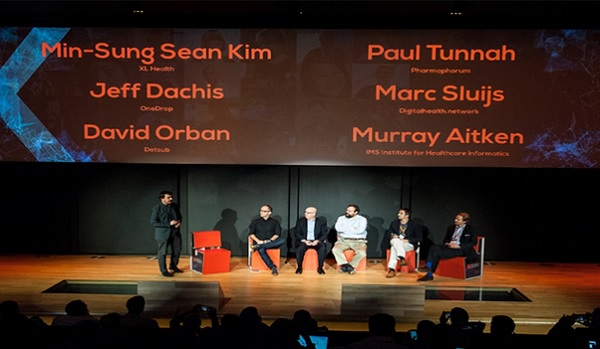Tunnah’s musings: Healthcare convergence at the frontiers of medicine

Ahead of this year’s Frontiers Health event in mid-November, Paul Tunnah muses on chairing a panel discussion on healthcare convergence and what this means for the future of medicine.
There are many different dictionary definitions of the term ‘convergence’, but essentially it refers to the coming together of two or more distinct entities, like the parallel train tracks that eventually meet on the horizon.
So how does this concept apply when it comes to healthcare?
Well, in November I’m looking forward to chairing a panel discussion at the Frontiers Health event in Berlin, where I will be joined by a panel of experts to discuss this very topic (at the time of writing who’s taking part is yet to be revealed, so I’m not going to give the game away – you’ll have to keep an eye on the website!).
They may have different views to me, but my definition of convergence in healthcare relates to the coming together of three distinct entities that currently operate in a somewhat disconnected way. These are traditional medicine (drug treatments), data and technology.
Aligning them will revolutionise how we denote medicine – how we maintain wellness, prevent and treat disease.
Traditional medicine is the one that has been around the longest, with the first modern drug companies emerging over 100 years ago. In identifying and mass-manufacturing chemicals with therapeutic properties (often discovered with some serendipity), quality and length of life has steadily improved, as previously fatal conditions have become preventable or treatable.
In the simplest sense of the terms, data and technology have been around just as long, in the form of paper medical records and early medical devices. But the exponential growth in computing power we have seen over the last 20 years has revolutionised both. Mapping the human genome has given us the data to understand diseases at the genetic level and facilitated the development of more effective, personalised medicines, while the technology to monitor and manage our own health now fits in our pockets, or even on our wrists. The rise of wearable health technology has given us all our own personal doctor, 24 hours a day, 365 days a year.
We’re now firmly in the age of real-time personalised big data, the quantified self and at a tipping point where technology has become as important in health management as pharmacological intervention.

Taking part in the healthcare convergence panel at Frontiers in 2015
So far these three entities remain broadly managed by quite different organisations. Traditional medicine remains the realm of the pharmaceutical industry; big data is driven by the computing and analytics experts like IBM; and the most effective technological medical interventions are, arguably, being driven by smaller startup companies, which are nimble, creative and willing to take big risks.
But for the next phase of medicine – healthcare convergence – they need to come together, and it’s exciting to see it starting to happen. Pharmaceutical companies are investing in digital innovation labs that see them support startups and collaborate with big data providers, while startups are working with big data providers to unlock the information they secure at the individual level.
I believe they are doing so because they recognise each other’s strengths and a mutual benefit. Pharma has a wealth of knowledge on the underlying mechanisms of disease and how to intervene, big data companies know how to integrate, process and disseminate information rapidly, and technology companies know how to innovate quickly and deploy solid design principles for good user experience.
As they do so, increased investment is flooding into the health sector, from those who recognise the opportunity and are buoyed by the battle cry of wealthy philanthropists who turn their attention to tackling disease. For example, think of the work Bill Gates has already done with the Bill and Melinda Gates Foundation, or the recent pledge by Mark Zuckerberg and Priscilla Chan to ‘cure, prevent or manage all disease by the end of this century’. The technology wunderkinds are growing up and, as they do, their own mortality – and that of their children – is becoming a focus for their attention.
It all adds up to a tremendously exciting time for healthcare. I’ve always believed in the power of ‘bringing healthcare together’ and it’s now happening at pace – not just between pharma, medics and patients, but also with technology companies, investors and empowered philanthropists.
The benefactors of this convergence will primarily be the patients and, as a result, the health systems they live in. Neither group cares which delivers the best outcome – traditional medicine, data or technology – they just want better health with the minimum cost (both human and financial). However, the real strength of convergence is in putting those ingredients together and cooking up something even more effective in combination.
I don’t know what that magic recipe is yet, but if you can join me in Berlin I’ll do my best to find out from my panel of experts.
See you at Frontiers Health and, in the meantime, stay well.
About the author:
Paul Tunnah is CEO & Founder of pharmaphorum media, which drives better communication, connection and collaboration between the pharmaceutical industry and other healthcare stakeholders. Its suite of services, from publishing (www.pharmaphorum.com) to its healthcare engagement agency (www.pharmaphorumconnect.com) are underpinned by the common strengths of extensive global networks, a firm finger on the pulse of changing market dynamics and deep expertise in creating engaging, relevant media.
For queries he can be reached through the site contact form or on Twitter @pharmaphorum.
Have your say: How do you see healthcare converging?












